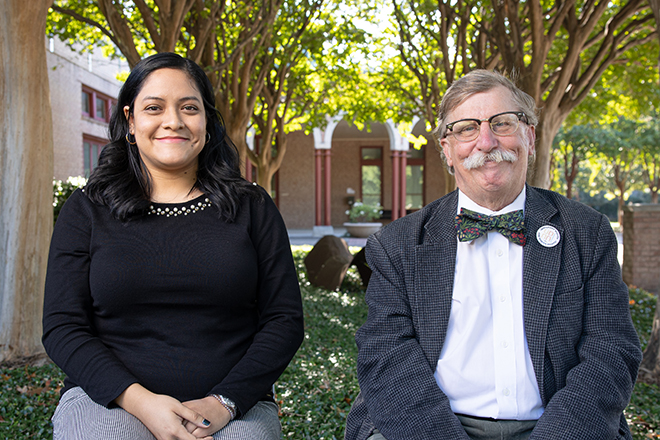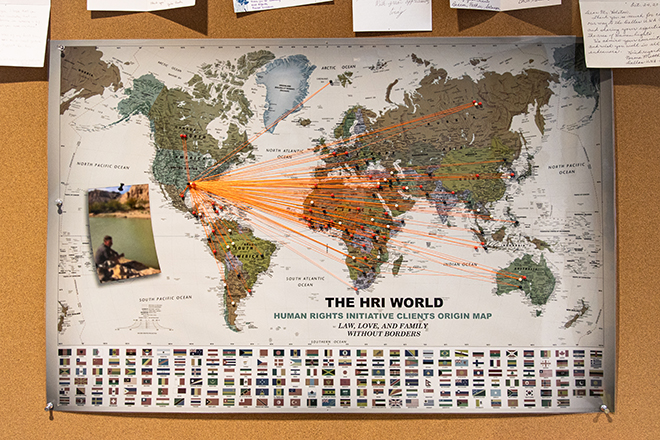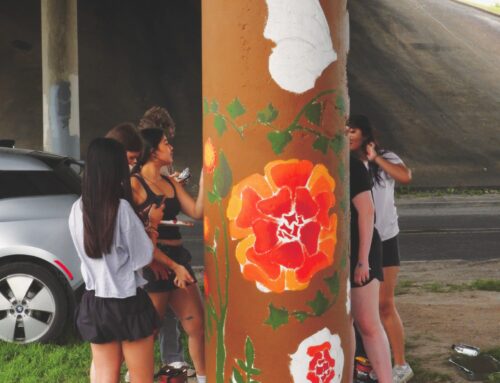
Photography courtesy of Gabriel Cano
Rosa Cruz was desperate. She had obtained a temporary green card when she married her husband, but when she became pregnant, he hit her. She decided to leave her spouse just as her green card was about to expire.
She met with an immigration lawyer but was unable to pay for legal assistance. With no money and nowhere to go for help, the lawyer referred her to Human Rights Initiative, an East Dallas nonprofit that provides free legal and social services to immigrants.
“I was in a very desperate situation,” Cruz says through an interpreter. “I lacked the resources to hire an attorney. I didn’t have any money. I didn’t have any support. They were able to help me, and that was when I felt relief.”
Casa View neighbor Bill Holston volunteered at HRI for 12 years as a pro bono attorney before he began leading the organization on Swiss Avenue as executive director in 2012.
“I knew the founders and had a lot of respect for both of them and felt confident it would be a good experience with them in charge,” Holston says. “Their vision was to do this compassion work with a lot of professionalism. I definitely try to live up to the vision they cast. I’ve tried to move us to be bolder in the cases we take and not worry about whether we’re going to win or lose — cases we believe in.”
Holston used his extensive community connections to build a network of lawyers, social workers, pastors, students and volunteers that the organization needs to operate. Last year, HRI served 612 clients from 47 countries with the help of 310 pro bono lawyers and 104 non-legal volunteers who donated around 9,000 hours of service.
Zeyla Gonzalez started volunteering at the nonprofit after she graduated college. About six months later, there was a job opening, and she became a Department of Justice accredited representative. Her primary responsibilities include providing volunteer attorneys with support, helping clients prepare documents and providing translation services.
“It’s definitely difficult to have a person who has gone through a lot, but at the end of the day, it brings me comfort that they’re potentially getting something positive out of a tragic event,” Gonzalez says. “Our services are not going to bring justice or restore the person, but they can get some sort of status — some sort of safety and access to services that may not be available in their countries.”

Gonzalez was one of the first people at HRI to help Cruz.
Cruz emigrated from Mexico to the United States, where she met her husband. Typically, a spouse helps advocate for restrictions on a partner’s green card to be removed. But because Cruz’s spouse was violent, she had to rely on the staff at HRI.
In 2019, Cruz’s case was approved, and she became a normal green cardholder.
“Initially [my husband and I] had good moments, but things began to change around the time I got pregnant,” Cruz says. “I don’t know if it was the stress of having to work, but he began to change how he was toward me. It was no longer a happy marriage.
“I’m glad I found this organization. I remember how it was difficult thinking nobody would help you. They really help you.”
Now, the East Dallas neighbor says she is looking for a better job to provide for her 4-year-old daughter and give her a good education.
 Human Rights Initiative has been helping people like Cruz for 20 years. But with the onset of the pandemic, many of those services moved online. HRI staff members meet with clients virtually when possible, but the challenges remain. Many clients live under the poverty level and don’t have access to computers or reliable Internet.
Human Rights Initiative has been helping people like Cruz for 20 years. But with the onset of the pandemic, many of those services moved online. HRI staff members meet with clients virtually when possible, but the challenges remain. Many clients live under the poverty level and don’t have access to computers or reliable Internet.
“It’s been more difficult not having that in-person connection when we’re dealing with delicate subjects,” Gonzalez says. “It seems impersonal to have a phone conference. Our clients don’t use Zoom. They don’t qualify for stimulus checks or unemployment. They’re worried about getting evicted. You need to have your basic needs met before you can get involved in your legal case.”
In March, HRI started an emergency assistance campaign to fortify its most vulnerable clients. The nonprofit collected nearly $150,000 from the City of Dallas, Texas Women’s Foundation, North Texas Cares and community donors to distribute among 75 families to help with rental and utility payments. It also gave 175 grocery cards and 685 bags of toiletries to 120 families.
The organization continued its fundraising efforts in October with a virtual version of its annual event, Rock Your Heart Out. The event pairs clients with immigrant artists who tell their stories through artwork, poems, music and more. Visual artwork was auctioned and raised about $10,000, which HRI will use to help more clients.
“We as an organization believe that our community benefits by having immigrants,” Holston says. “They are extremely resilient people with tremendous work ethics. I’ve never come at this work with a lot of pity. It’s more of a sense of respect and appreciation for what they can do, and that’s contribute.”





